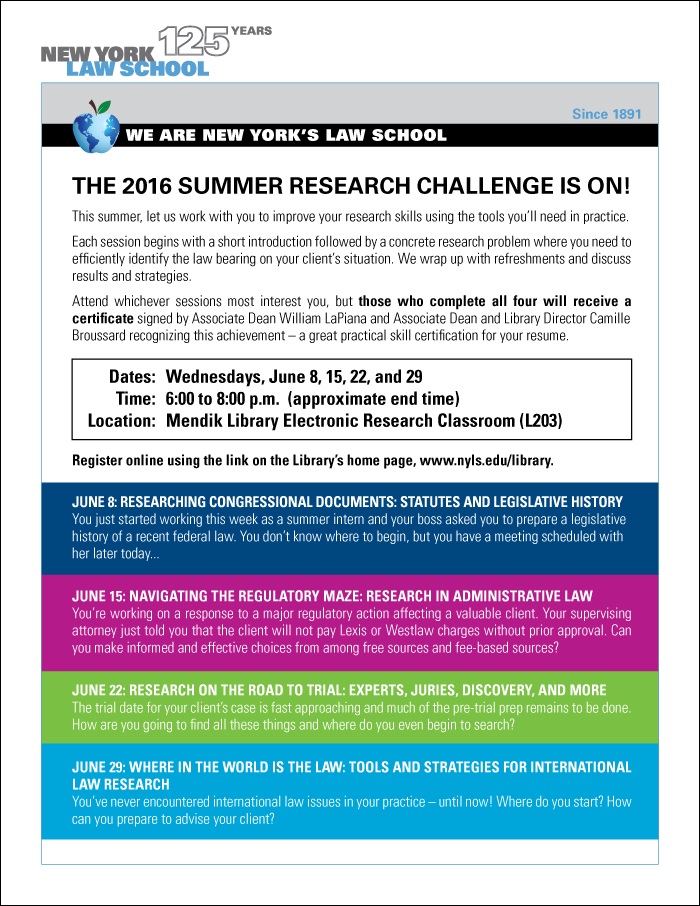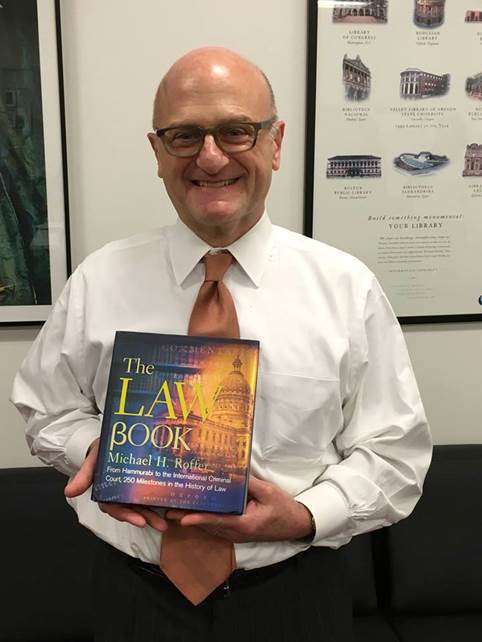Summer Extension of LexisNexis and Westlaw Passwords
Student access to LexisNexis and Westlaw are based on academic subscription plans maintained by New York Law School. To learn about the special rules and requirements for accessing these systems over the summer months, please visit our Summer Extension page.
Celebrate Law Day
In 1958, President Eisenhower designated May 1 “Law Day, USA.” Law Day celebrates the rule of law and its contributions to Americans’ many freedoms. Law Day 2016 is especially significant as it marks the 50th anniversary of perhaps the best-known U.S. Supreme Court case, Miranda v. Arizona.
The theme for this year’s observance is Miranda: More than Words. Additional information on Law Day and many downloadable resources relating to Miranda can be found on the ABA’s Law Day web page.
Michael H. Roffer wins The Joseph L. Andrews Legal Literature Award!
At this year’s Annual Meeting of the American Association of Law Libraries, our very own Michael H. Roffer, Associate Librarian for Reader Services & Professor of Legal Research will be honored with The Joseph L. Andrews Legal Literature Award, for his book The Law Book: From Hammurabi to the International Criminal Court, 250 Milestones in the History of Law.
Established in 1967 to honor Joseph L. Andrews, reference librarian at the Association of the Bar of the City of New York, the Andrews Legal Literature Award recognizes significant textual contributions to legal literature. To find out more about Michael’s book, click here or stop by the Library and check it out.
Congratulations, Michael! Your Library family is proud of you!
The Supreme Court Vacancy
The passing of Supreme Court Justice Antonin Scalia created a vacant seat on the nation’s highest court. Article II section 2 of the Constitution provides the mechanism to fill that seat, stating that the President “shall nominate, and by and with the Advice and Consent of the Senate, shall appoint Judges of the Supreme Court.” Since the Supreme Court was established in 1789, 160 nominations have been submitted to the Senate. The last Justice nominated and appointed to the Supreme Court was Justice Elena Kagan on August 5, 2010, after Justice John Paul Stevens announced his retirement in April of that year. Because it is a presidential election year, more controversy than usual now surrounds the nomination and appointment process .
For more information on the nomination and confirmation process as well as the history of past nominations and appointments, visit HeinOnline’s “History of Supreme Court Nominations” and the Georgetown Law Library’s Supreme Court Nominations Research Guide. .
Meet Peggy!
The President has proclaimed March 2016 as Women’s History Month and has asked all Americans to celebrate International Women’s Day on March 8, 2016. Our friends at HeinOnline have introduced Peggy, their new Women and the Law database. It brings together books, biographies and periodicals dedicated to the role of women in society and the law. You can access it from the HeinOnline home page. In addition, the Library of Congress has a dedicated web page for Women’s History Month, including information about events, ceremonies, and celebrations.
Find Love in the Library
As an early Valentine’s Day treat the Mendik Library once again offers this easy opportunity to WIN great study aids, texts, Starbucks gift cards, NYLS t-shirts, Lexis points, and other prizes (including a personally inscribed copy of Professor Roffer’s newly published “The Law Book: From Hammurabi to the International Criminal Court, 250 Milestones in the History of Law”). And did we mention chocolate?
Click here to access the Valentine’s Day Info Hunt – Questions from Cupid. Each slide includes one question (there are only 7) and easy, step-by-step instructions. Click here to access an answer sheet or pick up a copy at the Reference Desk. Either submit your completed answer sheet at the Reference Desk or e-mail it to reference@nyls.edu by 5:00 PM on Thursday, February 11. The drawing will take place outside the library entrance on February 11 at 5:45 PM. You need not be present to win, but an additional entry form will be added for each student who does attend!
The Natural Born Citizen
There’s been a lot of debate lately about the citizenship of presidential candidates and the constitutional requirement that only a “natural born Citizen” is eligible for the Office of President. You can find the relevant provision in Article II, Section 1, Clause 5 of the United States Constitution.
It was not until 1868, however, that the Fourteenth Amendment established “birthright” citizenship, declaring all persons born in the U.S. to be citizens. That was only one aspect of the amendment’s profound importance. For a brief introduction to what historians and scholars describe as the most important amendment since the adoption of the Bill of Rights in 1791, see this excerpt from Professor Michael Roffer’s recently published The Law Book: From Hammurabi to the International Criminal Court, 250 Milestones in the History of Law.
Group Study Room Policy
Please remember the policy governing the Mendik Library’s Group Study Rooms:
Group study rooms are for groups of students to work on academic tasks. A study group consists of two or more students, conversing in a normal tone of voice. Study groups are welcome to use these rooms on a first-come-first-served basis.
Individual use is allowed only when study groups are not using the room. Individual studiers must share the room, or yield it if the conversation bothers them. Be considerate of other library users who may require the room. Do not stay for more than four hours.
Also, remember to leave the room clean and in order. All trash should be placed in waste baskets and furniture returned to original locations. Do not store or leave your belongings unattended.
Contact a librarian at X-2332 if you have any questions or need assistance.
We appreciate everyone’s cooperation.
Join Us for Coffee . . .
We love allowing our students to bring their coffee (and other drinks) into the Library, a tradition that will continue alongside our New Year’s resolution to permit only those drinks arriving (and remaining) in spill-proof containers. Our NYLS Mugs–available at the Circulation Desk for $5–are perfect in that role! Bottoms up!




